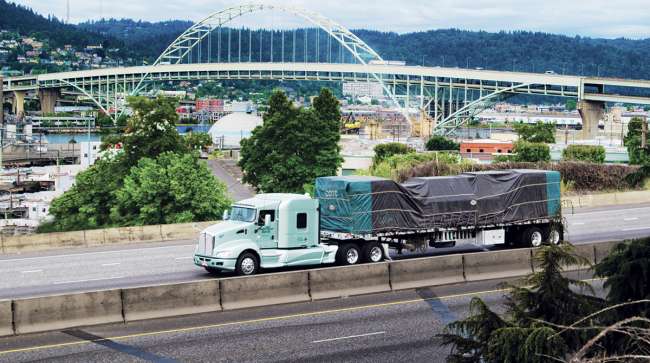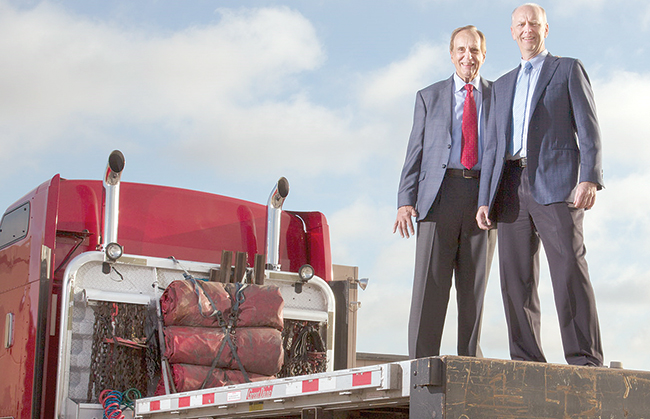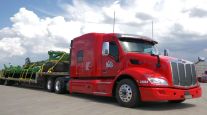Senior Reporter
Daseke Reports 32% Increase in 1Q Revenue to $433 Million

Flatbed and specialized carrier Daseke Inc. reported May 6 that first-quarter revenue increased 32% to $433 million, compared with $327.6 million in the same period last year, but posted a decline in earnings due to increased investments.
The jump in revenue comes, in part, because in 2017 and 2018 the Addison, Texas-based carrier was one of the trucking industry’s busiest participants in the acquisition market.
“We’re the No. 1 flatbed and specialized provider in terms of capacity. We are in the top 10 of all truckload carriers, and out of the top 25 carriers, we were the fastest-growing last year. These statistics are proof that the growth strategy we have implemented is working and the operation that we have built has created the leading flatbed and specialized trucking company in North America,” said CEO Don Daseke during a conference call with reporters and financial analysts.
The company’s stated strategy is to target acquiring established, well-run regional carriers and retain existing leadership to continue running the businesses.
Daseke Inc. ranks No. 29 on the Transport Topics Top 100 list of the largest for-hire carriers in North America.
Daseke reported a net loss of $10.5 million or 16 cents per share compared with a loss of $2 million or 4 cents per share for the same period a year ago, which the company attributed to spending on growth initiatives.
“The decline was largely due to investments made at the corporate level, including Daseke Fleet Services in May of last year, the recent launch of Daseke Logistics, the sheer fact that our size of our operations has grown substantially in the last three quarters compared to the prior year, and our new management hires,” said Daseke. “These investments are integral to our growth strategy and I’m confident they will continue to provide significant benefits to our company’s future growth and success.”
Daseke’s operating ratio worsened to 98.0 from 95.2 in the first quarter of 2018. Operating ratio is a company’s operating expenses as a percentage of its revenue, and it is used to determine efficiency. The lower the ratio, the greater the company’s ability to generate a profit.
Company officials said the severe weather and record-breaking cold in many parts of the country in late January and early February impacted the operating ratio, but they expect it to improve later this year.
“The density we have built gives us the opportunity to really drive asset utilization in this segment,” said COO Chris Easter. “We have some of the most efficient flatbed operators in the business.”
In the flatbed division, revenue increased 84.8% to $269.7 million compared with $184.9 million a year ago. Total miles driven increased 3.2% to 54.7 million compared with 51.5 million a year ago.

CEO Don Daseke (left) and President Scott Wheeler by Kye Lee, Daseke Inc.
Income from flatbed operations improved by 52.9% to $7.8 million compared with $5.1 million a year ago.
Daseke’s specialized segment saw first-quarter revenue up 22.9% to $167.9 from $145 million. Total miles driven increased 5% to 63.1 million miles from 57.9 million during the same period a year ago.
Income in the specialized segment declined nearly 53% to $3.3 million from $7 million in the first quarter of 2018.
Given its aggressive approach to acquisitions, Daseke was asked about potential interest in Youngstown, Ohio-based flatbed truckload carrier Falcon Transport, which closed last month. In response, the company’s leadership said right now it is more interested in integrating the businesses it has purchased, rather than making new purchases.
“We’re going to focus on 2019. Our primary focus is on free cash flow generation, deleverage of the business and dialing in the operations with our new COO,” said President Scott Wheeler. “That does not mean that if something opportunistic came along, we would certainly take a look at it and consider it, but that is not our primary focus for the current period.”




